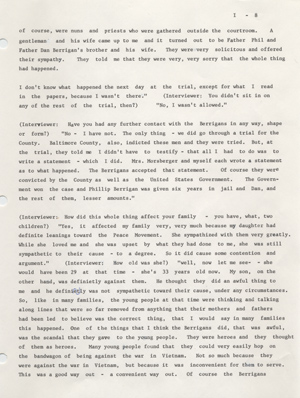 |
Burning of draft board records by Philip and Daniel Berrigan and others, May 17, 1968: an interview with Mary E. Murphy given on November 2, 1972
 |
10 / 15 |
 |



| Collection: |
Friends of Catonsville Library |
| Date: |
1972-11-02 |
| Date of Digitization: |
2004-03-29 |
| Source: |
Catonsville Library |
| Original Dimensions: |
28 x 22 cm |
| Creator: |
Murphy, Mary E. |
|
|
Notes:
This a transcript of a recorded interview with Mrs. Mary E. Murphy who was the Chief Clerk at the Draft Board office no. 33 at the time of the event of the forceful removing and burning of the draft cards by the Catonsville Nine group.
Transcription: of course, were nuns and priests who were gathered outside the courtroom. A
gentleman and his wife came up to me and it turned out to be Father Phil and
Father Dan Berrigan's brother and his wife. They were very solicitous and offered
their sympathy. They told me that they were very, very sorry that the whole thing
had happened.
I don't know what happened the next day at the trial, except for what I read
in the papers, because I wasn't there."(Interviewer: You didn't sit in on
any of the rest of the trial, then?)"No, I wasn't allowed."
(Interviewer: Have you had any further contact with the Berrigans in any way, shape
or form?) "No - I have not. The only thing - we did go through a trial for the
County. Baltimore County, also, indicted these men and they were tried. But, at
the trial, they told me I didn't have to testify - that all I had to do was to
write a statement - which I did. Mrs. Morsberger and myself each wrote a statement
as to what happened. The Berrigans accepted that statement. Of course they were
convicted by the County as well as the United States Government. The Govern-
ment won the case and Phillip Berrigan was given six years in jail and Dan, and
the rest of them, lesser amounts."
(Interviewer: How did this whole thing affect your family - you have, what, two
children?) "Yes, it affected my family very, very much because my daughter had
definite leanings toward the Peace Movement. She sympathized with them very greatly.
While she loved me and she was upset by what they had done to me, she was still
sympathetic to their cause - to a degree. So it did cause some contention and
argument." (Interviewer: How old was she?) "well, now let me see- - she
would have been 29 at that time - she's 33 years old now. My son, on the
other hand, was definietly against them. He thought they did an awful thing to
me and he definitely was not sympathetic toward their cause, under any circumstances.
So, like in many families, the young people at that time were thinking and talking
along lines that were so far removed from anything that their mothers and fathers
had been led to believe was the correct thing, that I would say in many families
this happened. One of the things that I think the Berrigans did, that was awful,
was the scandal that they gave to the young people. They were heroes and they thought
of them as heroes. Many young people found that they could very easily hop on
the bandwagon of being against the war in Vietnam. Not so much because they
were against the war in Vietnam, but because it was inconvenient for them to serve.
This was a good way out - a convenient way out. Of course the Berrigans
|




